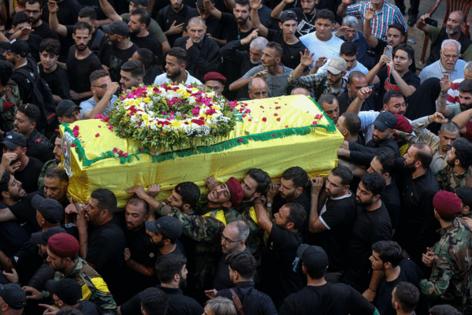North Israel targeted as Hezbollah responds to pager attacks
Published in News & Features
The exchange of fire — and of rhetoric — between Israel and Hezbollah intensified on Sunday as the Lebanon-based group launched about 115 rockets, missiles and drones toward vast areas of Israel’s north.
Hezbollah said it was targeting military facilities in retaliation for the pager and other electronic device explosions last week that killed at least 39 people in Lebanon. Sunday’s Hezbollah projectiles were headed as far south as the Haifa area, about 27 kilometers (17 miles) from the Israel-Lebanon border.
“We have entered a new phase titled ‘the battle of open-ended reckoning,’” said Hezbollah Deputy Secretary General Sheikh Naim Qasem.
Israeli emergency services said three people were injured from a barrage fired toward a residential area at Kiryat Bialik. Other fallen projectiles were identified in the residential communities of Tsur Shalom and Moreshet. Numerous fires were ignited in the area.
In response, the IDF said it attacked Hezbollah military targets in Lebanon, including rocket launchers, and said it will intensify efforts to degrade the Iran-backed group’s capabilities and infrastructure. Israel carried out more than 60 airstrikes early Sunday, according to Lebanon’s state-run NNA.
“In the last few days, we inflicted on Hezbollah a sequence of blows that they did not imagine,” Israeli Prime Minister Benjamin Netanyahu said in a statement on Sunday. “If Hezbollah did not understand the message, I promise you — they will understand the message.”
With hostilities on the rise, Israeli Defense Minister Yoav Gallant held “several” calls with his U.S. counterpart Lloyd Austin about developments in the north as well as the IDF’s ongoing activities against Hamas in Gaza, according to a readout from his office.
“Israel does not want to get into a war with Lebanon, but Lebanon has been hijacked by a terror organization which is also a political party called Hezbollah, it’s been armed to its teeth by Iran,” Israeli President Isaac Herzog told Sky News on Sunday.
On Saturday, Israel attacked some 400 Hezbollah targets which it said included thousands of launcher barrels and the group’s infrastructure in southern Lebanon. An IDF spokesperson said Sunday that the strikes had been in part preemptive, by narrowing down the barrage subsequently fired at Israel.
Schools were shut across large areas of Israel’s north on Sunday, as part of a broader change in the home front command’s guidelines. In most of these areas restrictions have also been placed on places of work, which are allowed to operate only if a shelter can be reached within in a short time.
Hospitals across northern Israel will move activities to protected areas, the health ministry said. Rambam Hospital in Haifa, one of the nation’s largest, will transfer operations a sheltered, underground parking lot, and non-urgent medical procedures have been postponed.
Outdoor gatherings have been limited to a maximum of 10 people and indoor gatherings to no more than 100. Beaches were also shut.
Commander killed
An Israeli air strike on Friday took down Ibrahim Aqil, the head of Hezbollah operations and commander of the Radwan Forces, and another 15 operatives including other senior members of the Radwan Forces. Aqil was wanted in the U.S. for the killing of U.S. citizens.
When struck they were said to have been operating underground in Beirut’s Dahieh quarter and planning future attacks, including an infiltration into Israeli territory. The Lebanese health ministry said the death toll from Friday’s strike has risen to 45.
“These guys who we eradicated on Friday, were gathering together in their apartment in Beirut in order to plan another Oct. 7,” Herzog said in an interview with CBS’s “Face the Nation” on Sunday, without offering evidence. Hezbollah, like Hamas in Gaza, is considered a terrorist organization by the U.S.
Earlier, thousands of Hezbollah commanders and operatives were injured and several dozens killed in an orchestrated attack carried out via pagers and other communication devices which exploded simultaneously for two consecutive days in Lebanon and Syria.
Israel hasn’t claimed responsibility for the attacks, which Hezbollah called unprecedented. The attacks involved packing explosives into thousands of small beepers and walkie-talkies at some point in the supply chain.
In other incidents on Sunday, Israel said it thwarted three drones launched from the east, including at least two from Iraq, which set off sirens at the Arava area and the Golan Heights.
Meanwhile, the Qatar-based news service Al Jazeera said “heavily armed and masked” Israeli forces raided its bureau in the West Bank, told staff to leave, confiscated equipment and ordered the office shut for 45 days.
Israel earlier in the year ordered the shutdown of Al Jazeera broadcasts from Israel, citing security concerns. The media outlet’s offices in Jerusalem were raided in May, as was a broadcasting station in Israel’s south.
_____
(With assistance from Alisa Odenheimer and Omar Tamo.)
_____
©2024 Bloomberg L.P. Visit bloomberg.com. Distributed by Tribune Content Agency, LLC.







Comments